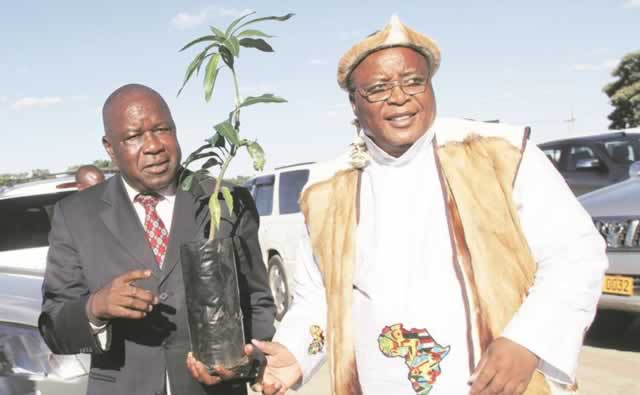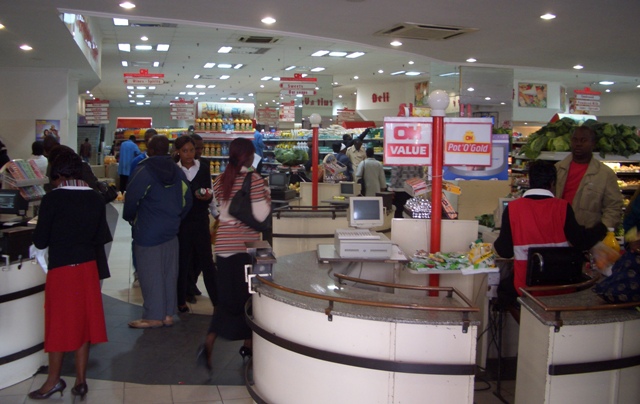Could that 2063 be now?

Jeffrey Gogo Climate Change
ONE year since the African Union Commission chairperson Dr Nkosazana Dlamini-Zuma called to the spirit of legendary pan-Africanist Dr Nkwame Nkrumah, what has changed, as far as building women’s resilience against climate change is concerned?
Well, not much. But with this year and the Africa Day celebrations today being themed around women, it is necessary to reflect on Dr Dlamini-Zuma’s letter from the future in the context of climate change and Agenda 2063 – the AU’s development plan for the next half century.
In the letter, delivered in January 2014 but set during AU’s centenary in 2063, Dr Zuma informs Dr Nkrumah, a pioneer in the building of a free Africa that by adopting forward looking strategies, Africa had “refused to bear the brunt of climate change.”
Dr Dlamini-Zuma made specific reference to the hazards of climate change on women in agriculture, Africa’s mainstay, the message coming as it does in a decade that the continental body has specially dedicated towards women empowerment.
By 2063, and in Dr Dlamini-Zuma’s eyes, women are seen to have managed to address the multi-layered challenges of climate change “through the intelligent application of centuries-old indigenous knowledge, acquired and conserved by African women who have tended crops all seasons.”
However, since the AU chair’s moving speech, there is not much to look back at as gratifying demonstration of the specific steps taken by the Union to build capacity and resilience among women in line with the long-term goals of Agenda 2063.
With numerous competing needs, these may be early days to begin to measure the African Union’s level of commitment towards achieving its set targets. But solid foundations must be set, and futuristic letters don’t do that.
One issue stands out, though. That’s the calling of proposals in January for funding for women-led projects in the areas of environment and climate change.
The AU will grant up to $25 000 to African governments or NGOs for projects that can prove an ability to empower women in water management, agriculture and energy.
The African Union says it is looking for projects capable of building women’s resilience against climate change.
Among other issues, such projects must “share women’s traditional and modern agricultural practices through preparation, sowing and transplanting, processing, storage and conservation of resources through exchange of knowledge and field visit; and encourage women to adopt new inexpensive technology and innovative practices to enhance their productiveness”.
Nothing has been paid out to anyone yet (on climate change), but the AU has demonstrated commitment, though delayed, to fulfilling a decision reached in 2011 to establish the Fund for African Women to finance everything related to women including climate change.
But we are yet to see deliberate top-down interventions from the AU, targeting those groups of women facing harsh climate realities due to their continued marginalisation, mainly on account of poor education, lack of access to information and resources.
Such interventions are crucial to bridging the social and economic gaps that perpetually hinder the capacity of poor African women to adapt or mitigate the adverse impacts of climate change.
Since the formation of the African Union in 1963 (then known as the Organisation of African Unity), many of its members have implemented important measures towards women empowerment.
Many women now occupy influential positions of authority in business, politics and economics, previously male domains.
Dr Joyce Banda was Malawi’s president for a couple of years and Sirleaf Ellen Johnson is now in her second term as Liberia’s president.
In Zimbabwe, Dr Joice Mujuru was deputy president for ten years until her removal from office last year.
The African Union secretariat is led by a woman, Dr Dlamini-Zuma. In many respects, African women no longer warm the back seats or any seats at all, as they did 50 years ago.
Inequalities still exist, however, in several countries. Opportunities and the creation of opportunities for women have not occurred at the level that the AU desires.
Education still remains poor, access to or ownership of critical factors of production such as land is limited and poverty remains entrenched among many African women.
Now, this is what limits African women’s ability to respond to the impacts of climate change, especially in agriculture where 70 percent of them are employed.
In Africa, agriculture faces the greatest challenge from changing climates, with crop output south of the Sahara expected to decline by up to 50 percent by mid-century.
We hope that by addressing inequalities in other areas such as business,
education and politics, the AU will be able to build capacity for tackling existing challenges in the climate change sector.
Any woman empowered economically or socially has a better chance at coping with climate impacts than the one still grappling with access to those issues.
Since 1963 when the AU was formed, climate change has emerged as one of the forceful handicaps curtailing Africa’s growth and development, apart from war, neo-colonialism and poverty.
Although the Union recognised the imperative of environmental protection at formation, the challenge of climate change had not been anticipated, certainly not the present scale which has resulted in manifold socio-economic sufferings.
For now, as Africa celebrates its hard-fought freedom from colonial subjugation, and its leaders trying hard to dispel the fleeting illusions of what it means to be free, we hold on to Dr Dlamini-Zuma’s aspirations.
And those are aspirations held dear by many women across Africa.
“The social impact of the agrarian revolution was perhaps the most enduring change it brought about,” says Dr Dlamini-Zuma in her letter from the future.
“The status of women, tillers of the land by tradition, rose exponentially. The girl child, condemned to the kitchen or the fields in our not too distant past, now has an equal chance of acquiring a modern education (or owning a farm or an agribusiness). African mothers today have access to tractors or irrigation systems that can be easily assembled.”
Would that 2063 be now! Happy Africa Day.
God is faithful.










Comments